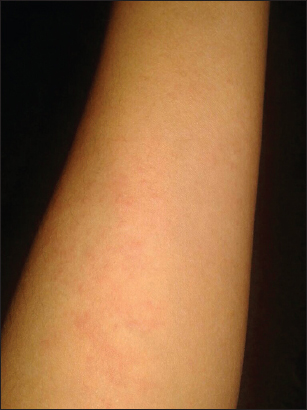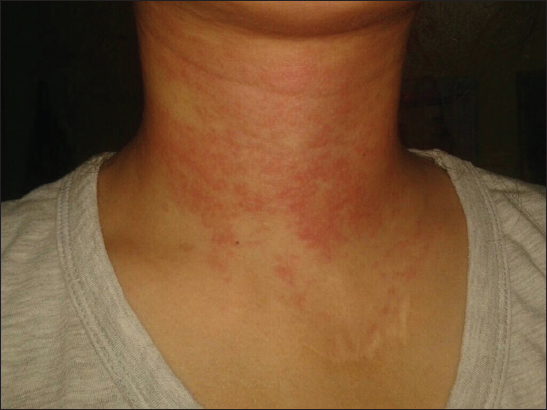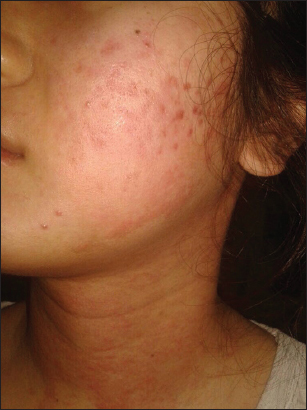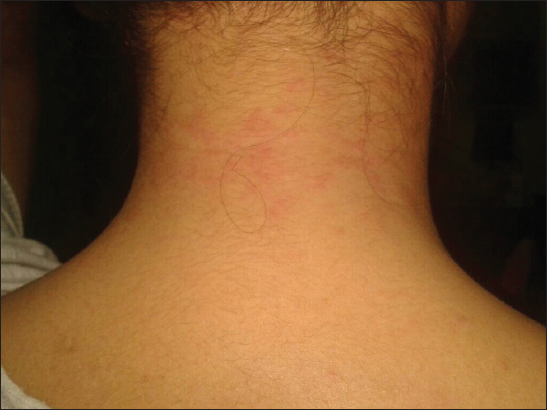Isotretinoin induced rash, urticaria, and angioedema: A case report
Zonunsanga
Department of Skin and VD, RNT Medical College, Udaipur, Rajasthan-313001, India
ABSTRACT
Isotretinoin is a vitamin A analogue, which is readily isomerized to tretinoin. It causes normalization of abnormal keratinisation. It also reduces sebum secretion. It also has anti-inflammatory as well as antibacterial properties. It has some adverse effects like teratogenecity, hypertriglyceridemia, pancreatitis, dryness of skin, cheilitis, altered liver functions etc. A 25 years old unmarried lady presented with acne vulgaris, who did not showed improvements with conventional (antibiotics) therapy was given isotretinoin. She developed maculopapular rash, urticaria and angioedema Isotretinoin induced urticarial rashes and angioedema is rarely reported as far as our knowledge is concerned.
Key words: Isotretinoin; acne vulgaris; urticaria; angioedema
INTRODUCTION
Isotretinoin is a vitamin A analogue, which is readily isomerized to tretinoin. It causes normalization of abnormal keratinisation [1–4]. It also reduces sebum secretion. It also has anti-inflammatory as well as antibacterial properties [1–5]. It has some adverse effects like teratogenecity, hypertriglyceridemia, pancreatitis, dryness of skin, cheilitis, altered liver functions etc. Isotretinoin induced urticarial rashes and angioedema is rarely reported as far as our knowledge is concerned [6–9].
CASE REPORT
A 25 years old unmarried lady presented with acne vulgaris for which she was prescribed oral Doxycycline 100 mg bd along with topical clindamycin gel and topical benzoyl peroxide 2.5% gel. Since there was no significant response even after 2 months, doxycycline was stopped and azithromycin pulse therapy (Azithromycin 500 mg od for 3 days, repeat the same after every 10 days) for 1 month along with the topical medications which were given previously, which did not show much improvement. Finally she was given Isotretinoin (after liver fuction test, Haemogram and lipid profiles were done and proved to be within normal range). After 5 days of medication, she started developing discrete to confluent, maculopapular rashes over bilateral upper extremities (Fig. 1), which was progressed to involve face (Fig. 2), neck (Figs 3 and 4), trunk and bilateral lower extremities (Fig. 5) within a period of 2-3 days. It was also associated with urticaria in some places, which was persisted for more than 24 hrs, along with oedema of face including lips, suggestive of angioedema. She was advised to stop all medications and was given oral prednisolone 2 mg for 7 days along with oral antihistamines. The urticaria and rashes began to resolve 3 days of starting prednisolone and complete clearance of the lesions took around 2-3 weeks. Provocation was not done as the patient reacted with urticaria and angioedema.
DISCUSSION
Isotretinoin is a first generation oral retinoid. It binds to the retinoid receptors. The retinoid receptors are of two families, RAR and RXR. RAR are paired with RXR whereas RXR may form homodimer with one another, or heterodimer with other receptors [1]. Upon binding of ligand, the receptor complex acts as transcription factor as well as antagonist of other transcription factors [1,6,7,10]. The resultant actions includes normalization of keratinization by regulating cell growth, differentiation and morphogenesis of keratinocytes; decreases cell cohesiveness causing comedolytic and antikeratinizing effects; immunomodulatory and antiinflammatory actions; decreasing sebum production; antibacterial action by reducing follicular space and nutritional supply of Propionibacterium acne [4,7,9,12]. The oral bioavailability may be enhanced with food. It has half life of 10-20 hours, and completely cleared from the body with 1 month of stoppage of the drug. Some common adverse effects include teratogenecity, reduced night vision, dry eyes, lipid profile abnormalities especially hypertriglyceridemia, pancreatitis, altered liver functions, agranulocytosis and raised intracranial pressure [2,12]. Sweet’s syndrome, hepatosplenomegaly, lymphadenopathy, myalgia, vasculitis, arthritis and inflammatory bowel diseases were also reported [6–8]. Besides, vitamin B 12 and folic acid level in the serum might be decreased after isotretinoin therapy [9]. There were some reports of association with myocardial infarction, stroke and thromboembolic events with isotretinoin [10]. In addition, nail changes like transverse leuconychia had been reported [11]. The FDA approved indications include nodulocystic acne and recalcitrant acne. Other off-label indications include follicular disorders like rosacea, Hirradenitis suppurativa etc; disorders of keratinization; Viral infection like Human papilloma virus infection [12]. It has category X status for pregnancy.
REFERENCES
1. Rao PK, Bhat RM, Nandakishore B, Dandakeri S, Martis J, Kamath GH, Safety and efficacy of low-dose isotretinoin in the treatment of moderate to severe acne vulgarisIndian J Dermatol 2014; 59: 316.
2. K?z?lyel O, Metin MS, Elmas OF, Cay?r Y, Aktaº A, Effects of oral isotretinoin on lipids and liver enzymes in acne patientsCutis 2014; 94: 234-8.
3. Cunha Filho RR, Almeida HL, JrBreunig Jde A, Angiodema due to oral acitretin and isotretinoinAn Bras Dermatol 2011; 86: 4 Suppl 1S28-30.
4. Saray Y, Seçkin D, Angioedema and urticaria due to isotretinoin therapyJ Eur Acad Dermatol Venereol 2006; 20: 118-20.
5. Barzilai A, David M, Trau H, Hodak E, Seborrheic dermatitis-like eruption in patients taking isotretinoin therapy for acne: retrospective study of five patientsAm J Clin Dermatol 2008; 9: 255-61.
6. Moghimi J, Pahlevan D, Azizzadeh M, Hamidi H, Pourazizi M, Isotretinoin-associated Sweet’s syndrome: a case reportDaru 2014; 22: 69.
7. Leibovitch I, Amital H, Levy Y, Langevitz P, Shoenfeld Y, Isotretinoin-induced adult onset Still’s diseaseClin Exp Rheumatol 2000; 18: 616-8.
8. Rashtak S, Khaleghi S, Pittelkow MR, Larson JJ, Lahr BD, Murray JA, Isotretinoin Exposure and Risk of Inflammatory Bowel DiseaseJAMA Dermatol 2014; 150: 1322-6.
9. Gökalp H, Bulur I, Gürer M, Decreased vitamin B12 and folic Acid concentrations in acne patients after isotretinoin therapy: a controlled studyIndian J Dermatol 2014; 59: 630.
10. Lorenzo N, Antuña P, Dominguez L, Rivero F, Bastante T, Alfonso F, Acute myocardial infarction in a young woman on isotretinoin treatmentInt J Cardiol 2014; 181C: 39-41.
11. Gregoriou S, Banaka F, Rigopoulos D, Isotretinoin-induced transverse leuconychiaJ Eur Acad Dermatol Venereol 2014; Oct29
12. Nickle SB, Peterson N, Peterson M, Updated Physician’s Guide to the Off-label Uses of Oral IsotretinoinJ Clin Aesthet Dermatol 2014; 7: 22-34.
Notes
Source of Support: Nil
Conflict of Interest: None declared.





Comments are closed.